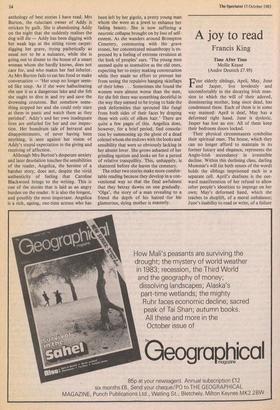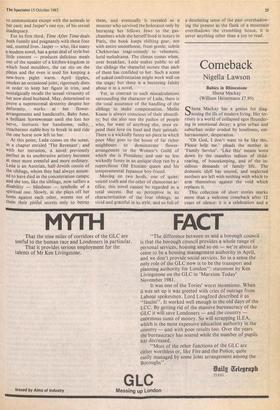A joy to read
Francis King
Time After Time Mollie Keane
(Andre Deutsch £7.95) L'our elderly siblings, April, May, June and Jasper, live lovelessly and uncomfortably in the decaying Irish man- sion to which the will of their adored, domineering mother, long since dead, has condemned them. Each of them is in some way maimed: April is deaf, May has a deformed right hand, June is dyslexic, Jasper has lost an eye. All of them keep their bedroom doors locked.
Their physical circumstances symbolise their spiritual ones. The house, which they can no longer afford to maintain in its former luxury and elegance, represents the Anglo-Irish ascendancy in irresistible decline. Within this declining class, darling Mummie's will (in both senses of the word) holds the siblings imprisoned each in a separate cell. April's deafness is the out- ward manifestation of her refusal to allow other people's identities to impinge on her own; May's deformed hand, which she teaches to shoplift, of a moral unbalance; June's inability to read or write, of a failure to communicate except with the animals in her care; and Jasper's one eye, of his sexual inadequacy.
For its first third, Time After Time deals both funnily and poignantly with these four sad, stunted lives. Jasper — who, like many a modern novel, has a great deal of style but little content — produces delicious meals out of the squalor of a kitchen-kingdom in which food moulders, the cat sits on the Plates and the oven is used for keeping a new-born piglet warm. April tipples, smokes an occasional joint, rigorously diets in order to keep her figure in trim, and nostalgically recalls the sexual virtuosity of her now dead husband. May, determined to Prove a supernormal dexterity despite her deformity, works at her flower- arrangements and handicrafts. Baby June, a brilliant horsewoman until she lost her nerve, instructs her handsome, sulky, treacherous stable-boy to break in and ride the one horse now left to her.
At this point, Leda comes on the scene, in a chapter entitled 'The Revenant'; and With her intrusion, a novel previously perfect in its unobtrusive artistry becomes at once more eventful and more ordinary. Leda is an Austrian, half-Jewish cousin of the siblings, whom they had always assum- ed to have died in the concentration camps; and she too, like the siblings, now suffers a disability — blindness — symbolic of a spiritual one. Slowly, as she plays off her hosts against each other, worms out of them their pitiful secrets only to betray them, and eventually is revealed as a monster who survived the holocaust only by betraying her fellows Jews to the gas- chambers while she herself lived in luxury in Paris, the book keeps shifting gear, not with entire smoothness, from gentle, subtle Chekhovian tragi-comedy to vehement, lurid melodrama. The climax comes when, over breakfast, Leda makes public to all the siblings the shameful secrets that each of them has confided to her. Such a scene of naked confrontation might work well on the stage; but there is a hectoring falsity about it in a novel.
Yet, in contrast to such miscalculations surrounding the character of Leda, there is the total assurance of the handling of the siblings to make compensation. Mollie Keane is always conscious of their absurdi- ty; but she also sees the pathos of people who, for want of anything else, must ex- pend their love on food and their animals. There is a wickedly funny set-piece in which poor May goes to the house of far richer neighbours to demonstrate flower- arrangement to the Women's Guild of which she is President; and one no less wickedly funny in an antique shop run by a supercilious Old Etonian queen and his temperamental Japanese boy-friend.
Moving on two levels, one of quiet- voiced truth and the other of clamorous ar- tifice, this novel cannot be regarded as a total success. But so perceptive in its characterisation of the four siblings, so vivid and graceful in its style, and so full of a desolating sense of the past overshadow- ing the present as the flank of a mountain overshadows the crumbling house, it is never anything other than a joy to read.











































 Previous page
Previous page